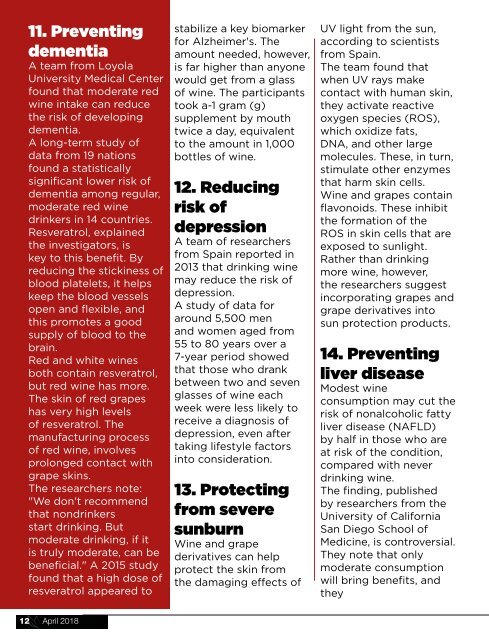04-2018-GL-FINAL
Create successful ePaper yourself
Turn your PDF publications into a flip-book with our unique Google optimized e-Paper software.
11. Preventing<br />
dementia<br />
A team from Loyola<br />
University Medical Center<br />
found that moderate red<br />
wine intake can reduce<br />
the risk of developing<br />
dementia.<br />
A long-term study of<br />
data from 19 nations<br />
found a statistically<br />
significant lower risk of<br />
dementia among regular,<br />
moderate red wine<br />
drinkers in 14 countries.<br />
Resveratrol, explained<br />
the investigators, is<br />
key to this benefit. By<br />
reducing the stickiness of<br />
blood platelets, it helps<br />
keep the blood vessels<br />
open and flexible, and<br />
this promotes a good<br />
supply of blood to the<br />
brain.<br />
Red and white wines<br />
both contain resveratrol,<br />
but red wine has more.<br />
The skin of red grapes<br />
has very high levels<br />
of resveratrol. The<br />
manufacturing process<br />
of red wine, involves<br />
prolonged contact with<br />
grape skins.<br />
The researchers note:<br />
"We don't recommend<br />
that nondrinkers<br />
start drinking. But<br />
moderate drinking, if it<br />
is truly moderate, can be<br />
beneficial." A 2015 study<br />
found that a high dose of<br />
resveratrol appeared to<br />
stabilize a key biomarker<br />
for Alzheimer's. The<br />
amount needed, however,<br />
is far higher than anyone<br />
would get from a glass<br />
of wine. The participants<br />
took a-1 gram (g)<br />
supplement by mouth<br />
twice a day, equivalent<br />
to the amount in 1,000<br />
bottles of wine.<br />
12. Reducing<br />
risk of<br />
depression<br />
A team of researchers<br />
from Spain reported in<br />
2013 that drinking wine<br />
may reduce the risk of<br />
depression.<br />
A study of data for<br />
around 5,500 men<br />
and women aged from<br />
55 to 80 years over a<br />
7-year period showed<br />
that those who drank<br />
between two and seven<br />
glasses of wine each<br />
week were less likely to<br />
receive a diagnosis of<br />
depression, even after<br />
taking lifestyle factors<br />
into consideration.<br />
13. Protecting<br />
from severe<br />
sunburn<br />
Wine and grape<br />
derivatives can help<br />
protect the skin from<br />
the damaging effects of<br />
UV light from the sun,<br />
according to scientists<br />
from Spain.<br />
The team found that<br />
when UV rays make<br />
contact with human skin,<br />
they activate reactive<br />
oxygen species (ROS),<br />
which oxidize fats,<br />
DNA, and other large<br />
molecules. These, in turn,<br />
stimulate other enzymes<br />
that harm skin cells.<br />
Wine and grapes contain<br />
flavonoids. These inhibit<br />
the formation of the<br />
ROS in skin cells that are<br />
exposed to sunlight.<br />
Rather than drinking<br />
more wine, however,<br />
the researchers suggest<br />
incorporating grapes and<br />
grape derivatives into<br />
sun protection products.<br />
14. Preventing<br />
liver disease<br />
Modest wine<br />
consumption may cut the<br />
risk of nonalcoholic fatty<br />
liver disease (NAFLD)<br />
by half in those who are<br />
at risk of the condition,<br />
compared with never<br />
drinking wine.<br />
The finding, published<br />
by researchers from the<br />
University of California<br />
San Diego School of<br />
Medicine, is controversial.<br />
They note that only<br />
moderate consumption<br />
will bring benefits, and<br />
they<br />
12 April <strong>2018</strong>


